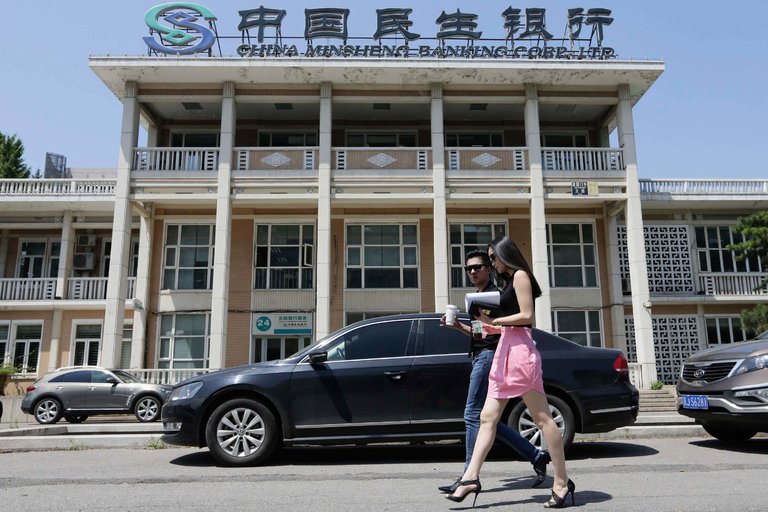
Scandal highlights big & growing risk: trillions of dollars of opaque financial products w little regulation or oversight. Marketed as low risk,”wealth management products” offer tantalizing returns that seem to beat low interest rates banks offer on regular accounts. Worry is many of the investments could fail — creating a major shock to Chinese economy, world’s second-largest after US. The products, often kept off banks’ balance sheets, are part of a vast, shadowy system of lending — one that has girded the Chinese economy and kept businesses growing, but could collapse quickly if investors decide, for whatever reason, they want their money back. Chinese investors have put $4.4 trillion into wealth management products, equivalent to about 40% of country’s annual economic output. Here, a China Minsheng branch in Beijing.
Last week, Chinese media reports revealed that more than $400 million of investors’ money had disappeared from China Minsheng Bank.
The scandal highlights a big and growing risk in the Chinese economy:
trillions of dollars of opaque financial products with little regulation and oversight.
Typically marketed as low risk, these investments, known as “wealth management products,”
offer tantalizing returns that seem to handily beat the interest rates banks offer on regular accounts.
Lured by the assurances of safety and promises of profit, investors have plowed their savings into the products.
But many of the investments have focused on coal, steel and real estate —
areas that are facing overcapacity problems in China.
As those areas show signs of trouble, the worry is many of the investments could fail —
creating a major shock to Chinese economy, world’s second-largest after the US.
The products, which are often kept off banks’ balance sheets, are part of a vast, shadowy system of lending —
one that has girded the Chinese economy and kept businesses growing.
The Chinese government has stepped in to protect investors, avert ripple effects and ensure social stability.
But those bailouts create their own challenges.
Investors, assured the government will come to the rescue, do not worry about the potential risks and continue to pour money into the products.
According to state news media, Chinese investors have put $4.4 trillion into wealth management products,
equivalent to about 40% of the country’s annual economic output.
“It invites moral hazard,” said Victor Shih, an associate professor at the University of California, San Diego, who specializes in the politics of Chinese banking policies.
“When you tell people they will get bailed out, they will often engage in very, very risky behavior.
And it encourages opportunistic and potentially reckless behavior on the part of the banks as well.”
China Minsheng, the bank at the heart of the latest scandal, had a good pitch.
The product, it told investors, would provide a return of 8% to 27%.
To sweeten the deal, the bank offered free golf events and trips to South Africa and other overseas locales.
Encouraged by the bank’s strong reputation, investors, including many older people, forked over a minimum of $145,000.
“My fund manager stressed again and again that there is no risk,” said Lisa Wang, 61,
who sank all her retirement money — $730,000 — into a single investment her fund manager repeatedly assured her was risk free.
The scandal at China Minsheng erupted last Tuesday when a Chinese newspaper, the 21st Century Business Herald, reported that
the bank’s wealth management product was forged, and did “not exist.”
The paper said more than 120 investors had registered to ask the bank to refund their investments and carry out an investigation.
Investors, including Ms Wang, gathered at a Bejing branch of the bank on Wednesday, pushing for it to make good.
“We’re not going home if you don’t return us our money,” one of them shouted.
Such protests are a big concern for the government.
Chinese investors, who often display a herd mentality, could dump the products once bad news spreads.
If investors suddenly demand their money back, it could create a liquidity crunch, putting significant pressure on the economy.
To avoid that situation, the government has generally acted quickly to repay investors when problems have surfaced.
Chinese regulators have expressed open concern about the proliferation of wealth management products.
In March, the chairman of China’s biggest bank and a senior Chinese insurance regulator issued strong warnings
about the dangers that shadow banking presented to the Chinese economy.
Along with wealth management products from banks, online lenders are jumping into the game, adding to the risks.
Last year, Chinese authorities said an online finance company had bilked investors out of more than $7.6 billion in what they called a huge Ponzi scheme.
The scandal at China Minsheng reflects “the lack of internal controls” at the bank,
said Wei Jiyao, an analyst at PY Standard, a research company based in Chengdu, China, that tracks wealth management products.
Wei predicted that regulators would probably respond by trying to tighten their control over the products.
While regulators have pledged to increase oversight of the industry in the past,
experts say that many banks have found ways to circumvent the rules.
Christopher Balding, an associate professor of finance at Peking University HSBC Business School in Shenzhen, China, said
he had not seen any indication that the authorities would seriously rein in wealth management products, even though “intellectually, they want to.”
Balding pointed in particular to a Communist Party congress scheduled for the fall,
when a big leadership shake-up is expected and when the government prizes social stability above all else.
The Chinese police have detained the head of the lender’s Hangtianqiao branch, Zhang Ying,
China Minsheng said in a statement to the Shanghai Stock Exchange on Tuesday.
The bank said it was assisting the police with an investigation.
Source: Chinese Investment Scandal Highlights ‘Shadow Banking’ Risks – The New York Times
